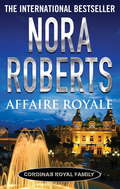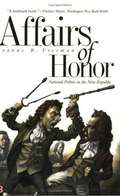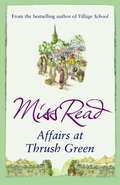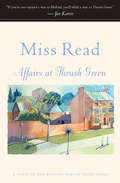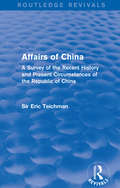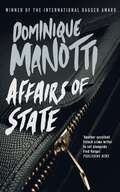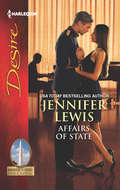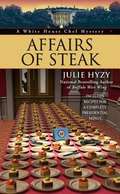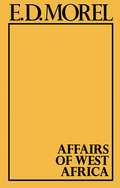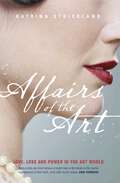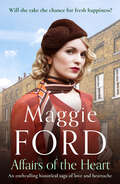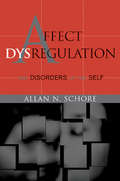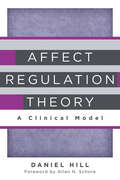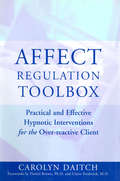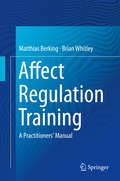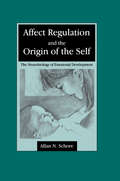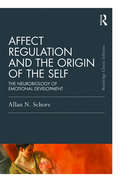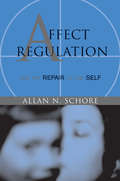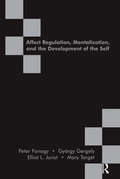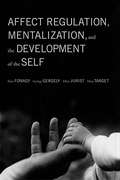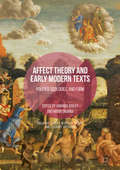- Table View
- List View
Affaire Royale: The Royals Of Cordina (Cordina's Royal Family #1)
by Nora RobertsAVAILABLE DIGITALLY FOR THE FIRST TIMEAfter a terrifying ordeal, Her Serene Highness Princess Gabriella has escaped her kidnappers, but lost her memory in the bargain. With her abductors still at large, Gabriella needs a protector fast. Smart, brash and courageous Reeve MacGee is the perfect candidate for the job. The handsome ex-cop is a man who can handle absolutely anything - except falling in love with the stunning, vulnerable woman in his care.Affaire Royale can be read as a gripping standalone novel. It is also the first book in the Cordina's Royal Family quartet. The series continues with Command Performance and The Playboy Prince and concludes with Cordina's Crown Jewel - all now available as Ebooks for the first time. Includes a preview of Command Performance
Affairs Of Honor: National Politics In The New Republic
by Joanne B. FreemanIn this extraordinary book, Joanne Freeman offers a major reassessment of political culture in the early years of the American republic. By exploring both the public actions and private papers of key figures such as Thomas Jefferson, Aaron Burr, and Alexander Hamilton, Freeman reveals an alien and profoundly unstable political world grounded on the code of honor. In the absence of a party system and with few examples to guide America's experiment in republican governance, the rituals and rhetoric of honor provided ground rules for political combat. Gossip, print warfare, and dueling were tools used to jostle for status and form alliances in an otherwise unstructured political realm. These political weapons were all deployed in the tumultuous presidential election of 1800--an event that nearly toppled the new republic. By illuminating this culture of honor, Freeman offers new understandings of some of the most perplexing events of early American history, including the notorious duel between Burr and Hamilton. A major reconsideration of early American politics, Affairs of Honor offers a profoundly human look at the anxieties and political realities of leaders struggling to define themselves and their role in the new nation.
Affairs at Thrush Green (The\beloved Thrush Green Ser. #7)
by Miss ReadThe well-loved residents of Thrush Green return in another slice of village life.Charles Henstock, rector of Thrush Green, has difficulty living up to his predecessor when he moves to the parish of Lulling. He faces opposition from the fearsome Mrs Thurgood and her arty daughter, Janet. Everyone in the district seems to be having their share of problems, not least Albert Piggott, who dreads the return of his wife Nelly.Meanwhile Kit Armitage returns to set elderly hearts fluttering. Could there be wedding bells in Thrush Green?
Affairs at Thrush Green (Thrush Green #7)
by Miss ReadThe well-loved residents of Thrush Green return in another slice of village life.Charles Henstock, rector of Thrush Green, has difficulty living up to his predecessor when he moves to the parish of Lulling. He faces opposition from the fearsome Mrs Thurgood and her arty daughter, Janet. Everyone in the district seems to be having their share of problems, not least Albert Piggott, who dreads the return of his wife Nelly.Meanwhile Kit Armitage returns to set elderly hearts fluttering. Could there be wedding bells in Thrush Green?
Affairs at Thrush Green: A Novel (The Beloved Thrush Green Series #7)
by Miss ReadMake a visit to this English village: &“What you will find in the novels of Miss Read is an aura of warm happiness.&” —The Columbus Dispatch In the quaint English village of Thrush Green, a terrible fire has burned the rectory to the ground. Now, kindly vicar Charles Henstock has been appointed to the neighboring town of Lulling and its combined parishes. But while he enjoys the beautiful Queen Anne house provided for him, and his pleasant new surroundings, going to a new church is never easy: Poor Dr. Henstock has encountered some very redoubtable females in Lulling; a full-scale power struggle erupts over the question of kneeling cushions for the Lady Chapel; and other difficulties revolve around the crotchety old sexton Albert Piggott. Meanwhile, a mysterious stranger arrives at the Fuschia Bush café, and its rivalry with the Two Pheasants becomes more acute. One knows, however, that Miss Read will set everything right in the end. &“Affairs at Thrush Green will surely delight all those addicted to Miss Read . . . and may well make converts of those who read her here for the first time.&” —The Plain Dealer
Affairs of China: A Survey of the Recent History and Present Circumstances of the Republic of China
by Eric TeichmanFirst published in 1938, this book aims to be a ‘true and objective’ account of China’s recent history and its present circumstances at the time, drawing on the author’s thirty years of experience as a member of the British consular service in China. The recurrent themes of the period are examined: the efforts of the Chinese leadership to build a new China out of the ruins of the old, their efforts to claim a place of equality among the nations of the world, and the development of the conflict between a resurgent China and the ambitions of Japan. Some of the issues studied were in the process of change and others definitely closed by war — nearly all were affected to some degree.
Affairs of State
by Dominique ManottiDominique Manotti is back on form with a tale of intrigue and corruption. A call-girl whose black book lists her elite international clients is found murdered in an underground garage; a plane bound for Iran laden with illegal arms disappears from the skies over Turkey, and the president's closest adviser Bornard, head of a controversial Elysee security unit, manipulates the system with consummate ease - and illegality. Until the day when rookie investigator Noria Ghozali determines to untangle the threads which bind these events together. In doing so she penetrates the Elysee's innermost system, confronts the workings of money and corruption within government, and in the process is forced to combat the institutional - and overt - racism which repeatedly stalls her.
Affairs of State
by Dominique ManottiDominique Manotti is back on form with a tale of intrigue and corruption. A call-girl whose black book lists her elite international clients is found murdered in an underground garage; a plane bound for Iran laden with illegal arms disappears from the skies over Turkey, and the president's closest adviser Bornard, head of a controversial Elysee security unit, manipulates the system with consummate ease - and illegality. Until the day when rookie investigator Noria Ghozali determines to untangle the threads which bind these events together. In doing so she penetrates the Elysee's innermost system, confronts the workings of money and corruption within government, and in the process is forced to combat the institutional - and overt - racism which repeatedly stalls her.
Affairs of State
by Jennifer LewisAmerican RoyaltyFirst she discovers she's the secret daughter of the American president, then she falls for a British prince. Ariella Winthrop's life can't get much more complicated. Or can it?Having fun with Simon Worth-passionate meetings, hiding their attraction from the public-is one thing. But getting serious? The British monarchy certainly doesn't want their beloved prince dating an American, much less one with her fair share of scandals. But when Ariella discovers she's pregnant with a royal baby, all bets are off. This woman is fighting for what is hers.
Affairs of Steak
by Julie HyzyWhite House chef Olivia Paras and her arch nemesis, White House Sensitivity Director Peter Everett Sargeant, must work together to solve the double murder of one of the First Lady's assistants and the Chief of Staff-before they become the next victims of a merciless assassin with a secret agenda.
Affairs of West Africa
by Edmund Dene MorelFirst published in 1968. This volume includes an new introduction on the life of Edmond Morel and his work as a journalist in West Africa and champion of African rights as he stood up against the cruelty of the Leopoldian system in the Congo state.
Affairs of the Art: Love, loss and power in the art world
by Katrina StricklandThe reputations of artists are curious things, influenced by factors beyond the quality of the work. Affairs of the Art explores the role those left behind play in burnishing an artist's reputation after he or she dies. Through interviews with those handling the estates of artists including Fred Williams, Brett Whiteley, John Brack, Howard Arkley, Bronwyn Oliver, George Baldessin and Albert Tucker, as well as a raft of art dealers, academics, curators and auctioneers, Strickland traverses the strange alleyways of the art market, where power resides with those who hold the best stock, and highlights the sometimes heart-wrenching way emotion and duty intersect in the making of decisions by those left behind.
Affairs of the Heart: An enthralling historical saga of love and heartache (Lett Family Sagas)
by Maggie FordCan she have a second chance at happiness?Mary Lett has been struggling since the death of her baby daughter. Her husband Geoffrey cannot understand why she finds it so difficult to let go of the memory of their child and seeks solace elsewhere.In an effort to forget his own feelings for Mary, Geoffrey’s brother, Henry, marries another woman. Meanwhile, Will considers marriage to be out of the question.When it becomes clear that Mary and Geoffrey have really hit the rocks, both Henry and Will are presented with another chance at happiness, but are either of them able to take it?An emotional saga of love and second chances, perfect for fans of Katie Flynn and Rosie Harris.
Affect Dynamics
by Christian E. Waugh Peter KuppensThis book features cutting edge research on the theory and measurement of affect dynamics from the leading experts in this emerging field. Authors will discuss how affect dynamics are instantiated across neural, psychological and behavioral levels of processing and provide state of the art analytical and computational techniques for assessing temporal changes in affective experiences.In the section on Within-episode Affect Dynamics, the authors discuss how single emotional episodes may unfold including the duration of affective responses, the dynamics of regulating those affective responses and how these are instantiated in the brain.In the section on Between-episode Affect Dynamics, the authors discuss how emotions and moods at one point in time may influence subsequent emotions and moods, and the importance of the time-scales on which we assess these dynamics.In the section on Between-person Dynamics the authors propose that interactions and relationships with others form much of the basis of our affect dynamics.Lastly, in the section on Computational Models of Affect, authors provide state of the art analytical techniques for assessing and modeling temporal changes in affective experiences.Affect Dynamics will serve as a reference for both seasoned and beginning affective science researchers to explore affect changes across time, how these affect dynamics occur, and the causal antecedents of these dynamics.
Affect Dysregulation and Disorders of the Self (Norton Series on Interpersonal Neurobiology)
by Allan N. SchoreThis volume (one of two) is the first presentation of Schore's comprehensive theory in book form, as it has developed since 1994. In 1994 Allan Schore published his groundbreaking book, Affect Regulation and the Origin of the Self, in which he integrated a large number of experimental and clinical studies from both the psychological and biological disciplines in order to construct an overarching model of social and emotional development. Since then he has expanded his regulation theory in more than two dozen articles and essays covering multiple disciplines, including neuroscience, psychiatry, psychoanalysis, developmental psychology, attachment, and trauma. Affect Dysregulation and Disorders of the Self contains writings on developmental affective neuroscience and developmental neuropsychiatry. It is absolutely essential reading for all clinicians, researchers, and general readers interested in normal and abnormal human development.
Affect Regulation Theory: A Clinical Model (Norton Series on Interpersonal Neurobiology)
by Allan N. Schore Daniel HillThe rich, complex theory of affect regulation boiled down into a clinically useful guide. Affect regulation theory—the science of how humans regulate their emotions—is at the root of all psychotherapies. Drawing on attachment, developmental trauma, implicit processes, and neurobiology, major theorists from Allan Schore to Daniel Stern have argued how and why regulated affect is key to our optimal functioning. This book translates the intricacies of the theory into a cogent clinical synthesis. With clarity and practicality, Hill decodes the massive body of contemporary research on affect regulation, offering a comprehensible and ready-to-implement model for conducting affect regulation therapy. The book is organized around the four domains of a clinical model: (1) a theory of bodymind; (2) a theory of optimal development of affect regulation in secure attachment relationships; (3) a theory of pathogenesis, in which disordered affect regulation originates in relational trauma and insecure attachment relationships; and (4) a theory of therapeutic actions targeted to repair the affect regulating systems. The key themes of Hill’s affect-focused approach include: how and why different patterns of affect regulation develop; how regulatory patterns are transmitted from caretakers to the infants; what adaptive and maladaptive regulatory patterns look like neurobiologically, psychologically, and relationally; how deficits in affect regulation manifest as psychiatric symptoms and personality disorders; and ultimately, the means by which regulatory deficits can be repaired. Specific chapters explore such subjects as self states, mentalization, classical and modern attachment theory, relational trauma (and its manifestations in chronic dissociation, personality disorders, and pervasive dissociated shame), supporting self-development in therapy, patient–therapist attunement, implicit and explicit therapeutic actions, and many more.
Affect Regulation Toolbox: Practical And Effective Hypnotic Interventions for the Over-Reactive Client
by Carolyn DaitchUsing hypnotic techniques to facilitate successful therapy. Rational judgment, soothing behavior, and calm observation often go out the window when responding to stress. This book presents hypnotherapeutic skills (including breathing exercises) and other easy-to-learn techniques that help people maintain healthy responses to stress and facilitate effective clinical work and a happier life.
Affect Regulation Training: A Practitioners' Manual
by Matthias Berking Brian WhitleyEmotion Regulation is currently one of the most popular topics in clinical psychology. Numerous studies demonstrate that deficits in emotion regulation skills are likely to help maintain various forms of psychological disorders. Thus, enhancing emotion regulation has become a major target in psychotherapeutic treatments. For this purpose, a number of therapeutic strategies have been developed and shown to be effective. However, for practitioners it is often difficult to decide which of these strategies they should use or how they can effectively combine empirically-validated strategies. Thus, the authors developed the Affect Regulation Training as a transdiagnostic intervention which systematically integrates strategies from cognitive behavior therapy, mindfulness-based interventions, emotion-focused therapy, and dialectical behavioral therapy. The effectiveness of ART has been demonstrated in several high-quality studies.
Affect Regulation and the Origin of the Self: The Neurobiology of Emotional Development
by Allan N. SchoreDuring the past decade a diverse group of disciplines have simultaneously intensified their attention upon the scientific study of emotion. This proliferation of research on affective phenomena has been paralleled by an acceleration of investigations of early human structural and functional development. Developmental neuroscience is now delving into the ontogeny of brain systems that evolve to support the psychobiological underpinnings of socioemotional functioning. Studies of the infant brain demonstrate that its maturation is influenced by the environment and is experience-dependent. Developmental psychological research emphasizes that the infant's expanding socioaffective functions are critically influenced by the affect-transacting experiences it has with the primary caregiver. Concurrent developmental psychoanalytic research suggests that the mother's affect regulatory functions permanently shape the emerging self's capacity for self-organization. Studies of incipient relational processes and their effects on developing structure are thus an excellent paradigm for the deeper apprehension of the organization and dynamics of affective phenomena. This book brings together and presents the latest findings of socioemotional studies emerging from the developmental branches of various disciplines. It supplies psychological researchers and clinicians with relevant, up-to-date developmental neurobiological findings and insights, and exposes neuroscientists to recent developmental psychological and psychoanalytic studies of infants. The methodology of this theoretical research involves the integration of information that is being generated by the different fields that are studying the problem of socioaffective development--neurobiology, behavioral neurology, behavioral biology, sociobiology, social psychology, developmental psychology, developmental psychoanalysis, and infant psychiatry. A special emphasis is placed upon the application and incorporation of current developmental data from neurochemistry, neuroanatomy, neuropsychology, and neuroendocrinology into the main body of developmental theory. More than just a review of several literatures, the studies cited in this work are used as a multidisciplinary source pool of experimental data, theoretical concepts, and clinical observations that form the base and scaffolding of an overarching heuristic model of socioemotional development that is grounded in contemporary neuroscience. This psychoneurobiological model is then used to generate a number of heuristic hypotheses regarding the proximal causes of a wide array of affect-related phenomena--from the motive force that drives human attachment to the proximal causes of psychiatric disturbances and psychosomatic disorders, and indeed to the origin of the self.
Affect Regulation and the Origin of the Self: The Neurobiology of Emotional Development (Psychology Press & Routledge Classic Editions)
by Allan N. SchoreFor over three decades, Allan N. Schore has authored numerous volumes, chapters, and articles on regulation theory, a biopsychosocial model of the development, psychopathogenesis, and treatment of the implicit subjective self. The theory is grounded in the integration of psychology, psychiatry, and neuroscience, and it is now being used by both clinicians to update psychotherapeutic models and by researchers to generate research. First published in 1994, this pioneering volume represented the inaugural expression of his interdisciplinary model, and has since been hailed by a number of scientific and clinical disciplines as a groundbreaking and paradigm-shifting work. This volume appeared at a time when the problem of emotion, ignored for most of the last century, was finally beginning to be addressed by science, including the emergent field of affective neuroscience. After a century of the dominance of the verbal left brain, it presented a detailed characterization of the early developing right brain and it unique social, emotional, and survival functions, not only in infancy but across all later stages of the human life span. It also offered a scientifically testable and clinical relevant model of the development of the human unconscious mind. Affect Regulation and the Origin of the Self acts as a keystone and foundation for all of Schore's later writings, as every subsequent book, article, and chapter that followed represented expansions of this seminal work.
Affect Regulation and the Origin of the Self: The Neurobiology of Emotional Development (Psychology Press And Routledge Classic Editions Ser.)
by Allan N. SchoreDuring the past decade a diverse group of disciplines have simultaneously intensified their attention upon the scientific study of emotion. This proliferation of research on affective phenomena has been paralleled by an acceleration of investigations of early human structural and functional development. Developmental neuroscience is now delving into the ontogeny of brain systems that evolve to support the psychobiological underpinnings of socioemotional functioning. Studies of the infant brain demonstrate that its maturation is influenced by the environment and is experience-dependent. Developmental psychological research emphasizes that the infant's expanding socioaffective functions are critically influenced by the affect-transacting experiences it has with the primary caregiver. Concurrent developmental psychoanalytic research suggests that the mother's affect regulatory functions permanently shape the emerging self's capacity for self-organization. Studies of incipient relational processes and their effects on developing structure are thus an excellent paradigm for the deeper apprehension of the organization and dynamics of affective phenomena. This book brings together and presents the latest findings of socioemotional studies emerging from the developmental branches of various disciplines. It supplies psychological researchers and clinicians with relevant, up-to-date developmental neurobiological findings and insights, and exposes neuroscientists to recent developmental psychological and psychoanalytic studies of infants. The methodology of this theoretical research involves the integration of information that is being generated by the different fields that are studying the problem of socioaffective development--neurobiology, behavioral neurology, behavioral biology, sociobiology, social psychology, developmental psychology, developmental psychoanalysis, and infant psychiatry. A special emphasis is placed upon the application and incorporation of current developmental data from neurochemistry, neuroanatomy, neuropsychology, and neuroendocrinology into the main body of developmental theory. More than just a review of several literatures, the studies cited in this work are used as a multidisciplinary source pool of experimental data, theoretical concepts, and clinical observations that form the base and scaffolding of an overarching heuristic model of socioemotional development that is grounded in contemporary neuroscience. This psychoneurobiological model is then used to generate a number of heuristic hypotheses regarding the proximal causes of a wide array of affect-related phenomena--from the motive force that drives human attachment to the proximal causes of psychiatric disturbances and psychosomatic disorders, and indeed to the origin of the self.
Affect Regulation and the Repair of the Self (Norton Series on Interpersonal Neurobiology)
by Allan N. SchoreThis volume (one of two) is the first presentation of Schore's comprehensive theory in book form, as it has developed since 1994. In 1994 Allan Schore published his groundbreaking book, Affect Regulation and the Origin of the Self, in which he integrated a large number of experimental and clinical studies from both the psychological and biological disciplines in order to construct an overarching model of social and emotional development. Since then he has expanded his regulation theory in more than two dozen articles and essays covering multiple disciplines, including neuroscience, psychiatry, psychoanalysis, developmental psychology, attachment, and trauma. Affect Regulation and the Repair of the Self contains chapters on neuropsychoanalysis and developmentally oriented psychotherapy. It is absolutely essential reading for all clinicians, researchers, and general readers interested in normal and abnormal human development.
Affect Regulation, Mentalization and the Development of the Self
by Peter Fonagy Mary Target Elliot L. Jurist Guörgy GergelyThis book focuses on the crucial importance of developmental work to psychotherapy and psychopathology. It offers an account of psychotherapy to integrate scientific knowledge of psychological development and represents psychological states in the minds of infants, children, adolescents, and adults.
Affect Regulation, Mentalization, and the Development of the Self
by Peter Fonagy Elliot Jurist Gyorgy Gergely Mary TargetWinner of the 2003 Gradiva Award and the 2003 Goethe Award for Psychoanalytic Scholarship. Arguing for the importance of attachment and emotionality in the developing human consciousness, four prominent analysts explore and refine the concepts of mentalization and affect regulation. Their bold, energetic, and encouraging vision for psychoanalytic treatment combines elements of developmental psychology, attachment theory, and psychoanalytic technique. Drawing extensively on case studies and recent analytic literature to illustrate their ideas, Fonagy, Gergely, Jurist, and Target offer models of psychotherapy practice that can enable the gradual development of mentalization and affect regulation even in patients with long histories of violence or neglect.
Affect Theory and Early Modern Texts: Politics, Ecologies, and Form (Palgrave Studies in Affect Theory and Literary Criticism)
by Amanda Bailey Mario DigangiThe first book to put contemporary affect theory into conversation with early modern studies, Affect Theory and Early Modern Texts: Politics, Ecologies, and Form demonstrates how questions of affect illuminates issues of cognition, political agency, historiography, and scientific thought in early modern literature and culture. Engaging various historical and theoretical perspectives, the essays in this volume bring affect to bear on early modern representations of bodies, passions, and social relations by exploring: the role of embodiment in political subjectivity and action; the interactions of human and non-human bodies within ecological systems; and the social and physiological dynamics of theatrical experience. Examining the complexly embodied experiences of leisure, sympathy, staged violence, courtiership, envy, suicide, and many other topics, the contributors open up new ways of understanding how Renaissance writers thought about the capacities, pleasures, and vulnerabilities of the human body.
